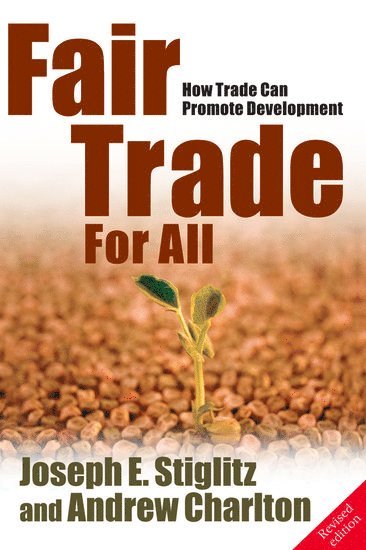
- Format
- Häftad (Paperback)
- Språk
- Engelska
- Antal sidor
- 340
- Utgivningsdatum
- 2007-07-01
- Upplaga
- New ed
- Förlag
- OUP Oxford
- Medarbetare
- Charlton, Andrew
- Illustratör/Fotograf
- 32 tables 23 figures
- Illustrationer
- 23 figures and 32 tables
- Dimensioner
- 233 x 155 x 25 mm
- Vikt
- Antal komponenter
- 1
- Komponenter
- 49:B&W 6.14 x 9.21 in or 234 x 156 mm (Royal 8vo) Perfect Bound on White w/Gloss Lam
- ISBN
- 9780199219988
- 540 g
Fair Trade For All
How Trade Can Promote Development
- Skickas från oss inom 3-6 vardagar.
- Fri frakt över 249 kr för privatkunder i Sverige.
Passar bra ihop
De som köpt den här boken har ofta också köpt Who's Afraid of Gender? av Judith Butler (inbunden).
Köp båda 2 för 706 krKundrecensioner
Fler böcker av Joseph E Stiglitz
-
Globalization and Its Discontents Revisited
Joseph E Stiglitz
-
People, Power, and Profits
Joseph E Stiglitz
-
Rewriting the Rules of the European Economy
Joseph E Stiglitz, Carter Dougherty, The Foundation For European Progressive Studies
-
The Quest for Security
Joseph E Stiglitz, Mary Kaldor
Recensioner i media
Diplomat 'A worthwhile read for anyone interested in trade and development.'
Övrig information
Joseph E. Stiglitz was awarded the Nobel Prize in economics in 2001 and is University Professor at Columbia University where he founded the Initiative for Policy Dialogue in 2000. He was Chair of President Bill Clinton's Council of Economic Advisors from 1995-97 and Chief Economist and Senior Vice-President of the World Bank from 1997-2000.His best known recent publications include 'Making Globalization Work' (2006), 'Globalization and its Discontents' (2002) and 'The Roaring Nineties' (2003).
Innehållsförteckning
Foreword; Glossary; 1. Introduction: The Story So Far; 2. Trade Can Be Good for Development; 3. The Need for a Development Round; 4. What Has Doha Achieved?; 5. Founding Principles: The Basis for a Fair Agreement; 6. Special Treatment for Developing Countries; 7. Priorities for a Development Round; 8. How to Open Up Markets; 9. Priorities Behind The Border; 10. What Should Not Be On the Agenda?; 11. Joining the Trading System; 12. Institutional Reforms; 13. Trade Liberalization and the Costs of Adjustment; Appendix 1: Empirical Review of Market Access Issues; Appendix 2: Empirical Review of the Singapore Issues


